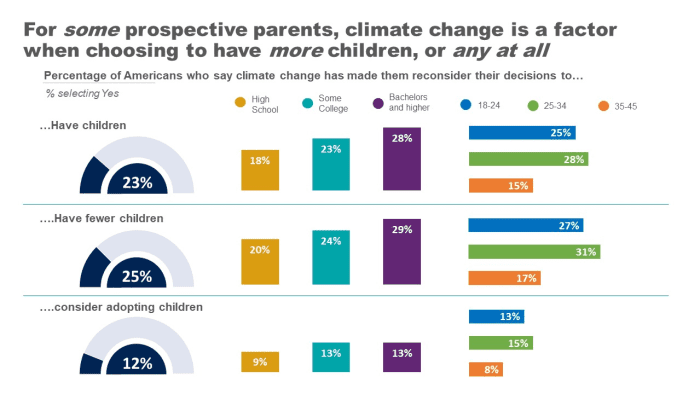This post was originally published on this site
Climate change has made some young Americans contemplating parenthood reluctant to add to the population. But a new survey shows the same group also has its doubts about adoption.
The attitudes toward adoption — with the global population likely crossing the 8 billion threshold in mid-November, according to a United Nations projection — pose their own challenges in a hotter, drier world that risks widening economic inequality.
The upward population trend threatens to leave even more people, especially in developing countries, further behind as governments struggle to provide enough classrooms and jobs for a rapidly growing number of youth, and food insecurity becomes an increasingly urgent problem, the U.N. said of its population figures.
A new poll of American 18- to 45-year-olds by ABC News and market-research firm Ipsos released this week found that this group has major concerns about climate change and its impact on the next generation. In fact, almost a quarter of this cohort say climate change has made them reconsider having a child in the future.
The same survey revealed that only one in 10 say climate change has made them consider adoption instead of having a biological child.
Read: Face of climate-change protest Greta Thunberg joins lawsuit against Sweden
This graphic offers a snapshot of the thinking among Gen Z and millennial respondents, including how their opinions change depending on education level:

ABC News/Ipsos
According to the survey:
- People under 35 are more likely to report climate impacting childbearing decisions compared to those who are slightly older, 35 to 45 years old.
- People with a college degree are more likely than those without a college degree to report climate impacting their decisions to have children.
- When it comes to whether or not climate change would make someone more likely to adopt than to have a biological child, there are no differences by education level.
Other polls have revealed a similar attitude among the age demographic most likely to be contemplating kids.
A small University of Arizona study released in 2021 showed climate change does indeed play an important role in deciding whether or not to have kids. Participants’ most common concern? Overconsumption. The Gen Z and millennial respondents worried about how their children would contribute to climate change by adding to the carbon emissions that are warming the atmosphere, as well as overusing resources like food and water that could become more scarce in the future.
Some participants in the University of Arizona survey also said they felt having more than two children would be problematic and even selfish, as they would be “over-replacing” themselves and their partner. Some said they saw adoption as a more responsible choice. “Adoption was seen as the low-carbon alternative,” said Sabrina Helm, an associate professor in the University of Arizona’s Norton School of Family and Consumer Sciences, who led the survey.
Another query, a Morning Consult poll of 4,400 Americans conducted around the same time last year, found that one in four adults without children say climate change influenced their reproductive decisions.
Sure enough, there may be other factors shaping reproductive choices, including career choices, lifestyle preferences, financial concerns, and less pressure from society to measure future happiness by expanding your family.
Read: More American women are having babies in their 30s than their 20s
The ABC News/Ipsos poll was taken in November, just after a closely contested U.S. midterm election proved to be a referendum on the Biden White House’s most-aggressive climate-focused spending and tax legislation in the country’s history. President Biden and the Democrats lost control of the House, but retained a narrow advantage in the Senate. It’s a scenario that could inspire U.S. oil-backing Republicans to chip around the edges of the Inflation Reduction Act, which was designed to influence conversions to electric cars over gas
RB00,
install solar power at home
ICLN,
and fund a big push for U.S. offshore wind
WNDY,
generation.
The ABC News/Ipsos poll didn’t ask about political affiliation, but other surveys have shown that younger voters who consider themselves Republicans favor more action to slow climate change than their older counterparts. Younger Republicans are more in line with younger, moderate Democrats on this issue. By and large, Democrats have been at the fore of climate change efforts, but more Republicans have gotten on board, typically favoring private-sector responses over government initiatives.
Further, the latest climate change poll was conducted as the United Nations gathered representatives from around the world in Egypt, at a conference known as COP27, to step up the pressure on rich nations like the U.S. not only to show more evidence that it can reach net-zero greenhouse gas emissions by 2050, but to help pay for the pollution choking the developing world.
It’s the developing world’s resources that are often drilled and mined to power the developed world, yet the developing emissions footprint is tiny relative to wealthier counterparts. Greenhouse gas emissions, produced mostly from combusting fossil fuels, are pushing up yearly average temperatures, making the ocean more acidic, and turning natural disasters like hurricanes more dangerous. What’s more, inaction on climate change will cost the global economy $178 trillion over the next 50 years, the Deloitte Center for Sustainable Progress has said.
With the warnings growing louder, it’s little surprise that younger people have taken notice.
“Global and national climate commitments are falling pitifully short,” U.N. Secretary-General Antonio Guterres said this fall. “We are headed for a global catastrophe.”


